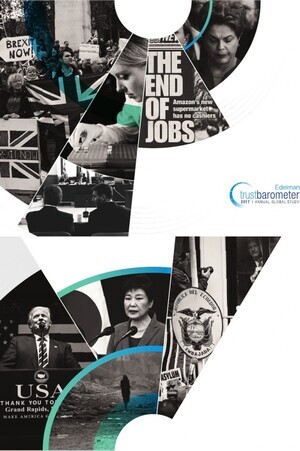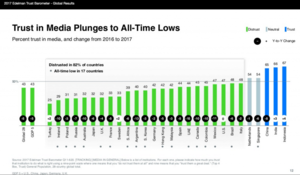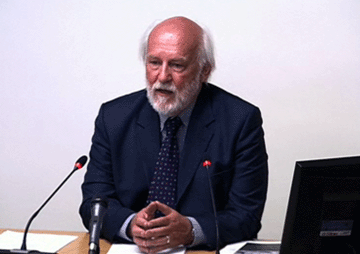From the recent Edelman Trust Barometer; former Press Ombudsman John Horgan at the Leveson inquiry in 2012
Further to the recent ‘Edelman Trust Barometer’…
Which shows trust in Irish media is at its lowest point since the poll was first taken 17 years ago…
Former Irish Times journalist, former Dublin City University professor, former Labour TD and senator and Ireland’s first press ombudsman John Horgan writes in today’s Irish Times:
Here, the review of the 2009 [Defamation] Act by Minister for Justice Frances Fitzgerald will include, not only the effects of the Act itself in relation to defamation proceedings, but the functions, powers, and effectiveness of the Press Council and the Press Ombudsman.
Some of the major issues for the Fitzgerald review, on the basis of a decade’s experience of our own system, could therefore usefully include the following:
– Should participation in the Press Council be effectively further incentivised for all non-broadcast media [freesheets, the online publishing activities of broadcasters, perhaps even bloggers] who see not just editorial but commercial and legal advantages in adherence to an effective body dedicated to the maintenance of professional standards?
– Should the Press Ombudsman and the Press Council – including their invaluable mediation service – be given enhanced legal standing, acceptable to the newspapers and journalists, so that they become a more frequent and effective final destination for dispute resolution, instead of an alternative route?
– Should media play their own part in this, and in enhancing the public acceptability of their voluntary system, by helping to develop, perhaps in consultation with the Press Council, more effective, and perhaps more generous, remedies for, and responses to, reasonable complaints from people whose reputations have been unfairly impugned?
– Should this also include – as a powerful implicit acknowledgment of every individual’s right to freedom of expression – more frequent offers, in appropriate circumstances, of the right of reply?
Just because these are all complex issues for public policy does not mean that they should be shirked. Now is as good a time as any to address them.
Falling trust in Irish media needs to be addressed (John Horgan, The Irish Times)
Meanwhile…
From the vaults…
In January 2012, Tom and Sally Fitzgerald made a complaint to the Press Council about the apology, which they claimed was in breach of the Code of Practice for Newspapers and Magazines.
The Press Ombudsman, John Horgan held that the newspaper, in publishing the apology, had failed to take into account the feelings of Kate Fitzgerald’s grieving parents and, following publication, failed to take sufficient remedial action to resolve their complaint.
A further claim that The Irish Times had breached the Code of Practice by failing to investigate, prior to editing, the truth or accuracy of the statements in Kate’s article was rejected by Mr Horgan, as being out of time on the basis that the article the subject of the apology had been published more than three months previously.
On appeal, the Press Council found that this latter decision was an administrative one, from which there was no appeal. Sally Ann Fitzgerald, from a newspaper family, found this decision inexplicable.
Five Years After (Broadsheet, August 23, 2016)
John Horgan’s Appearance At Leveson (Broadsheet, July 17, 2012)





